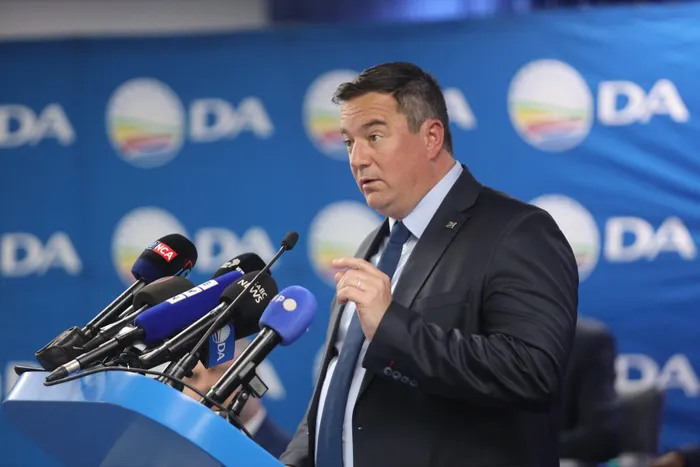Experts call for 'balanced' approach to BBBEE reforms

DA Federal leader John Steenhuisen has proposed sweeping changes to the country's progressive laws, saying they are regressive.
Image: Timothy Bernard/Independent Newspapers
Economic experts have called for a balanced view on possible changes to the country's Broad-based Black Economic Empowerment (BBBEE) policies, and other pro-black South African laws, which must balance the needs of everyone, especially those who stand to benefit from these laws.
This comes as the DA through its leader, John Steenhuisen, proposed 'sweeping' changes to some of the country's pro-black policies.
On Monday, during a media briefing, Steenhuisen launched the party's six-point plan to turbocharge the economy, which includes changes to the BBBEE, Land Expropriation and Employment Equity Act.
Steenhuisen slammed South Africa’s BBBEE policies, saying these policies have failed to uplift the most disadvantaged citizens and have instead promoted elite enrichment of politicians and their affiliates.
As a result, Steenhuisen put forward what he called an inclusive alternative to the current framework of transformation, which he said is based on need rather than race, and which unlocks opportunity for all South Africans.
He said the party's proposal will ensure affordable and reliable energy to power the economy, save the country's network industries from collapse, ensure the government's spending for growth, while also addressing the corruption and service delivery challenges in municipalities, and arresting the crime epidemic.
"Unlike the National Dialogue, which will cost R700 million, the DA’s plan is free. The fact that others are now withdrawing from the National Dialogue shows what it is: an illegitimate talk shop. These reforms will create an environment that encourages growth and lifts people out of poverty. The DA will fight for these reforms in Cabinet, Parliament, and all spheres of government," he said.
Reacting to the DA's proposals against BBBEE policies, Constitutional law expert Dr Shadi Maganoe stated that from a constitutional perspective, any reform to economic legislation must balance two imperatives: compliance with the Constitution’s transformative objectives, particularly the commitment to substantive equality and socio-economic redress in the Bill of Rights, and the need to promote sustainable economic growth.
"Proposals that aim to improve policy efficiency and enhance service delivery can be considered positively, provided they remain consistent with constitutional principles. The true test is whether these reforms uphold the Bill of Rights and advance the public interest without undermining existing protections for historically disadvantaged groups," he stated.
Maganoe stated that the country's BBBEE policies have a legal framework, rooted in section 9(2) of the Constitution, which expressly permits legislative and other measures designed to protect or advance persons disadvantaged by unfair discrimination.
"While the policy’s objectives are constitutionally sound, questions around its implementation, including the targeting of benefits and the risk of 'fronting', have been widely debated. Legally, any amendments would need to preserve the constitutional mandate for redress while addressing inefficiencies or unintended economic distortions. An overhaul or repeal, without an alternative mechanism for substantive equality, would risk constitutional challenge, which in turn puts the rights of those the policy intended to protect at risk," she stated.
On the Expropriation Act, Maganoe indicated that the act must be read in light of Section 25 of the Constitution, which protects property rights while allowing expropriation for a public purpose or in the public interest, subject to just and equitable compensation.
"The Courts have clarified that public interest includes land reform and equitable access to natural resources. Any reform or repeal of the Act must ensure procedural fairness, proportionality in compensation, and protection against arbitrary deprivation. The legal debate is not much about whether expropriation powers should exist, they are constitutionally recognised, and more about the scope, checks, and balances/protections that are built into the legislation," she added.
Professor Vally Padayachee indicated that the country's economic landscape is complex and is shaped by a history of inequality and systemic disadvantages stemming from apartheid, which need to be considered whenever changes are introduced to the policies.
"While the DA’s call for urgent reforms is a response to the poor economic climate, there are valid concerns about dismantling the very frameworks intended to provide support for disadvantaged populations.
"Instead of completely removing these laws, a better approach may involve revisiting and refining them to close gaps and improve their implementation," Vally stated.
siyabonga.sithole@inl.co.za